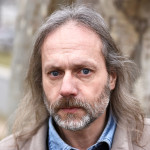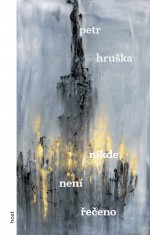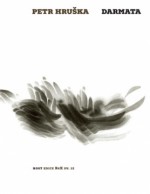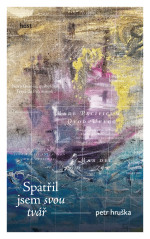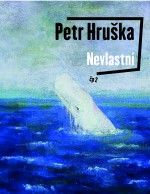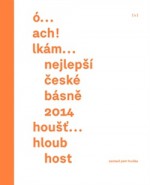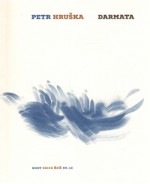Petr Hruška (1964) is a poet and literary historian who lives in Ostrava. His poetry has won a number of state and international awards, including the Czech State Award for Literature in recognition of his collection Darmata (To No Travail, 2012), and the Magnesia Litera, the most prestigious annual literary award in the Czech Republic, for his newest collection, Spatřil jsem svou tvář (I Caught Sight of My Face, 2022), an extended meditation on Magellan’s voyage around the world. He writes screenplays, publishes a literary magazine, co-organizes literary events and festivals, and participates in civic initiatives for environmental causes and the preservation of cultural monuments in his region. Hruška also writes short stories, columns, and essays, many of which are collected in V závalu (Cave-In, 2020). He works at the Czech Academy of Sciences in Prague, specializing in poetry from the twentieth century to the present, and is the author of scholarly articles and books on Czech poetry. Collections of Hruška’s poetry have been published in French, German, Polish, Italian, Hungarian, Romanian, and Croatian translation.
Petr Hruška
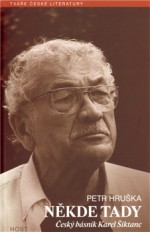
Někde tady. Český básník Karel Šiktanc
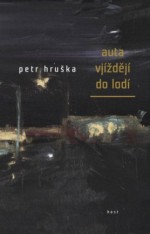
The Cars Drive onto the Boat
Auta vjíždějí do lodí
| Title | Publisher | Year | Selected published translations | Awards |
|---|---|---|---|---|
| I Caught Sight of My Face (Spatřil jsem svou tvář) | Host | 2022 |
2023 Magnesia Litera – Poetry |
|
| Nowhere It Is Said (Nikde není řečeno) | Host | 2018 | ||
| Not My Own (Nevlastní) | Argo | 2017 | ||
| Best Czech Poems of 2014 (Nejlepší české básně 2014) | Host | 2014 | ||
| Petty Tragedies (Darmata) | Host | 2013 | HU |
2013 State Award for Literature |
| Petty Tragedies (Darmata) | Host | 2012 | HU |
2013 State Award for Literature |
| Někde tady. Český básník Karel Šiktanc | Host | 2010 | ||
| The Cars Drive onto the Boat (Auta vjíždějí do lodí) | Host | 2007 | ||
| Green Sweater (Zelený svetr) | Host | 2004 | ||
| The Door Always Used to Close (Vždycky se ty dveře zavíraly) | Host | 2002 | ||
| Months (Měsíce) | Host | 1998 | ||
| Living No Room (Obývací nepokoje) | Sfinga | 1995 |

Někde tady. Český básník Karel Šiktanc

The Cars Drive onto the Boat
Auta vjíždějí do lodí
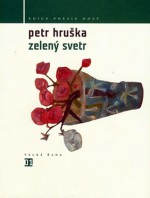
Green Sweater
Zelený svetr
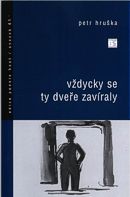
The Door Always Used to Close
Vždycky se ty dveře zavíraly
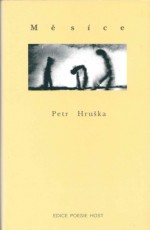
Months
Měsíce
Obývací nepokoje
Petr Hruška
Living No Room
Obývací nepokoje
| Award | Year | Country |
|---|---|---|
| Magnesia Litera – Poetry | 2023 | Czech Republic |
| Premio Ciampi | 2014 | Italia |
| State Award for Literature | 2013 | Česká republika |
| Dresden Lyric Award | 1998 | Deutschland |
Praise
Hruška’s collection is filled with personal moments as well as general imperfect truths. This is why it is easy for the imperfect person to appreciate Hruška’s poetry. “We have our best table setting out?” asks Hruška’s verse, which, like the whole book, is beautiful and sad at the same time.
—Michael Alexa
Literarni.cz
Before the fall of communism he received the title of engineer at Báňská Technical University, then he continued his studies at the Faculty of Arts in Ostrava. He gained his doctorate in Czech literature at Masaryk University in Brno and he still teaches at both of these institutes today. His poems have been published in anthologies and journals, he is a member of the editorial board of Host magazine, he published the magazine Landek and is involved in the publication of Odvrácená strana měsíce (The Dark Side of the Moon). He has helped organise literary and artistic events in Ostrava.
He made his literary debut with the collection Obývací nepokoje (Living No Room, Sfinga, 1995). Critic Radim Kopáč wrote that, “it is distinguished by its impressionist obsession with the moment and detail.”
In the collection, Měsíce (Moons, Host, 1998), the author emphasises time, as though on the one hand he had stopped time, but on the other, he was aware of it as a headlong rush. “While the first one, measurable and identifiable, was embodied in the rigidness rising up into the walls of the living room, into the cursory glances and snatches of ‘life’s course’, the second one, internal time running through the action, has speeded up to the point of anguish,” wrote writer Ondřej Macura about the collection. Hruška’s collections are always complemented by wonderful illustrations – Adam Paleček illustrated the first collection, Zdeněk Janošec-Benda the second and for the third collection, Vždycky se ty dveře zavíraly (The Doors Always Used to Close, Host, 2002) the author used Daniel Balabán. Here, unlike with the first two collections, there is an obvious romantic dimension to the poetry: “The door used to always close over by itself, year after year, with unhurried haste. / Now it won’t even budge. / In front of it a woman guiltily lifts a large / undershirt, which fell from the line during the night. / The man looks at the woman with the shirt. Probably the wind. / Some time during the night. / Both would like to know, to know exactly when / it happened, both would like to be there at that moment.”
Two years later saw the publication of Hruška’s Zelený svetr (Green Sweater, Host, 2004), an edition of previous collections supplemented with prose work and illustrations by Hana Puchová.
Jakub Špaňhel illustrated the collection Auta vjíždějí do lodí (The Cars Drive onto the Boat, Host, 2007) which won the Jan Skácel Award. Critic Dora Koprálová wrote that, “With Auta vjíždějí do lodí Petr Hruška as a poet of civil nightmares has perhaps reached the end of the road of an economical and persistent rigidity. At the same time, the question emerges of where you can actually go with this obsession to observe in every detail a glimpse of eternity and damnation.”
Hruška won the State Prize for Literature for the collection Darmata (Host, 2012) and was nominated for the Magnesia Litera for poetry. “Today by the river / you shouted something at me / across the murky rapids / and I couldn’t understand you, it sounded like / Darmata! / Oh can I darmata!” This is from the poetic dialogues between a father and son from which the collection gets its name. Just as with travelling (trains, boats), children (parents) are also a fundamental part of Hruška’s poetics. In his review of the book Jan Štolba asks, “The mysterious word darmata conveys the impression of an anagram. Somewhere in the background a small drama continues to play out, twisted by our misunderstandings, mistakes and inadequacies. But might there be other hidden meanings even here? And in particular the same gesture, the same image: the incomprehensible cries of a boy across a river. Perhaps he could be understood in this way: What have you given me then? What is this confused gift? What should I do to stop from floundering within it for nothing?”
In 2015 Revolver revue published Hruška’s book Jedna věta (One Sentence), which is part of a long-term project, in which the leading Czech writers describe the year with one sentence about each day.
